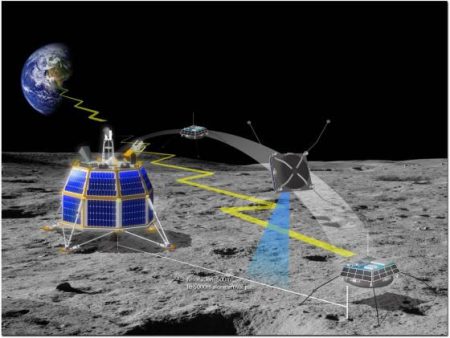August 4, 2016 – Who owns the Moon? According to the Outer Space Treaty ratified by members of the United Nations in 1967, no one nation or individual. A further agreement in 1979 signed or agreed to by 16 nations governs activities on the Moon including its exploration and use.
Article 4 of that agreement states the “use of the moon shall be the province of all mankind and shall be carried out for the benefit and in the interests of all countries, irrespective of their degree of economic or scientific development.”
In Article 11 it further states “the moon and its natural resources are the common heritage of mankind.”
It goes on further to state “neither the surface nor the subsurface of the moon, nor any part thereof or natural resources in place, shall become property of any State, international intergovernmental or non-governmental organization, national organization or non-governmental entity” and that “placement of personnel, space vehicles, equipment, facilities, stations and installations on or below the surface of the moon….shall not create a right of ownership over the surface or subsurface of the moon.”
It should be noted that the United States, Russia and China, the world’s most significant space-faring nations, are not signatories to the 1979 United Nations agreement on the Moon. The only nation of consequence in space that is a signatory is India. The lunar agreement governs all other major celestial bodies with the exception of those that come in contact with our Earth. So meteors and meteorites are fair game wherever they land.
In 2015 the United States government enacted the Commercial Space Act which governs commercial exploitation of space resources. The act gives Americans the right to exploit asteroid and other space resources including the Moon. The justification for the act was expressed by the sponsor of the bill, congressman Kevin McCarthy, who states “this bill will unite law with innovation, allowing the next generation of pioneers to experiment, learn and succeed without being constrained by premature regulatory action.” In other words, outer space is open for business to any American with the means to exploit its potential wealth.
Damn the torpedoes and full speed ahead
With the legislation to justify the action in place the American government on the basis of a domestic law is forging ahead and given permission to a U.S. private company to send a robotic lunar lander to the Moon in 2017.
Moon Express, a California company, applied to the U.S. Federal Aviation Administration on April 8, 2016 for flight plan approval to go to the Moon and land on it. They have been okayed by the agency to proceed.
Moon Express is one of 16 companies competing for the Google Lunar X-Prize, a $3o million U.S. competition in which the winner collects a grand prize of $20 million. If all goes according to plan Moon Express will launch its MX-1 lander, seen in the image below, near the end of 2017 within the deadline imposed by the prize and meet the conditions set by it. The MX-1 must get there and then perform a maneuver after landing that has it travel 500 meters from its original touchdown site. And finally the lander must beam its success in high definition back to Earth.
Winning the prize is just the first step. Moon Express has much more ambitious goals. States Naveen Jain, co-founder and chairman, “In the immediate future, we envision bringing precious resources, metals, and Moon rocks back to Earth.” Eventually the company hopes to offer a filling station service to other space faring companies that drop by taking advantage of the known water resources discovered on the lunar surface.
How does Moon Express intend to get to the lunar surface?
The company has signed a multi-launch agreement with Rocket Lab, a New Zealand-based company, the developer of the Electron. Last year I wrote about the company and its unique rocket featuring electric engines each capable of generating 716,000 Newtons (161,000 pounds) of thrust. Rocket Lab, according to its founder, has a mission to make space launch to orbit and the Moon cheaper than any agency or company including SpaceX. The rocket structure is made from carbon composites giving it low mass and high strength. That means it needs less fuel on board to get to space. That combined with its unique electric motors powered by lithium polymer batteries and a proprietary fuel and liquid oxygen mixture makes it a very different commercial player than its commercial launch rivals.
How will the world react to commercial companies exploiting space resources?
Moon Express may be the first to have received regulatory approval for a commercial mission to the Moon, but many other companies are well on their way to establishing for profit space businesses. Whether it is Bigelow with its inflatable hotel habitats, or Planetary Resources, with its mission to mine asteroids, we are seeing activity that is contrary to the initial efforts of most of the world’s nations to establish outer space as a province to benefit all humanity.
If the United States has the right to do this then what is to stop commercial operators in China, Russia, and elsewhere, to get their nations’ approval to carve out economic exploitation zones on the Moon, Mars and other space destinations?








